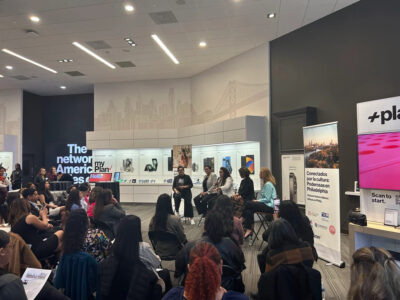
The following is a report done in partnership with Temple University’s Philadelphia Neighborhoods Program, the capstone class for the Temple Journalism Department.
Hanging from one of the cabinets of PredictiveEdge CEO Bill Thompson’s desk is a piece of paper that reads, “Parenting Problems? Who You Going To Call?”
Under the text are two pictures: the first of Facebook creator and CEO Mark Zuckerberg, the second is the logo for PredictiveEdge’s behavioral social media program, called ‘the Proactive Parenting Network.’
With more than 500 million active users, children of all ages are increasingly influenced by Facebook and other social networking websites, many of which don’t go beyond basic safety features for users.
“The Internet’s not going away. Facebook’s not going away. It’s going to continue to become more and more dominant in our kids’ lives. We’re the generation that has to adapt to that,” Thompson said.
The newly launched Proactive Parenting Network serves as a resource for parents to better understand and protect their kids in the digital realm. It’s a package of resources to help combat the internet-age old problem of safe browsing for kids, including more adaptive and advanced tools like a keyword-driven firewall and more powerful browsing history and data collection.
But is it sapping away privacy?
“The child a lot of times is the more technically proficient member of the household. When the child is more technically proficient, parents are sometimes afraid of getting involved in those types of discussions,” said Keith Harry, PredictiveEdge’s vice president of product development.
The network, which has exclusive partnerships with Internet education distributor i-SAFE, and the Mayo Clinic helps bridge this gap by providing resources for parents to better understand the digital landscapes their children are encountering.
“We took all of the content i-SAFE is delivering to kids in the classroom and deliver it to parents online,” Thompson said. “What we’re trying to do is give the parent a lot of great information and encourage them to go to their child and engage with them.”
The Proactive Parenting Network also utilizes a subscription based online monitoring service called inSight, which utilizes a natural language processor to alert parents to possible problems. Unique to the processor is the ability to detect slang and read within context.
“Everything goes through the language processor and we look at everything from keywords to context,” Thompson said.
Thompson also explained how the inSight looks for predatory behavior through its recognition of what are called grooming questions.

A monitoring system like inSight may seem to be invasive to a child’s privacy but PredictiveEdge took steps in development to alleviate those concerns by bringing in focus groups of both parents and children to come up with a system that benefits parents without violating their children’s privacy.
“We don’t want spying. We want the kids to be safe and for you to be a parent but we understand that kids don’t want parents to see everything that they’re posting,” said Harry, who explained that a child must opt into the program for the system to be able to “scrape” profile information and enable monitoring.
The monitoring system also keeps each individual families’ data private.
“We can see the traffic but not what the traffic is. We have a strict privacy policy, that we don’t look at any of the data. The only people with access to that database are the parents, it’s their data,” Thompson said.
Currently the Proactive Parenting Network targets Facebook primarily, but Thompson says he understands that as websites like Twitter and Tumblr attract younger users, they must expand to other sites and platforms.
Harry explained that Predictive Edge has already extended the network onto mobile technology exclusively on the iPhone with plans to make the technology available in Droid applications as well. He also said that Predictive Edge is looking into expanding to Internet gaming as well as other social media websites.

Thus far feedback to the two-week-old system, which launched on June 2, has been positive especially from parents, Thompson said confidently.
“We’ve received nice letters that say, ‘This is the first time I’ve been able to really talk to my kids about this.’ It’s really building a bridge between parent and child and that’s what we’re trying to do here,” Thompson said.
When it comes down to it, the Proactive Parenting Network offers a service so that parents can continue to parent beyond not just in reality but digitally.
“This is no different than telling your kid to look both ways before crossing the street,” Thompson, a father of four, said. “On the Internet world you have to train them the same way so they don’t get caught in one of the traps that are out there.”
Join the conversation!
Find news, events, jobs and people who share your interests on Technical.ly's open community Slack

Philly daily roundup: A better coffee supply chain; Philly Tech Week returns; Apply to Pennovation Accelerator

Philly daily roundup: Startups want office culture; New Venture Lab cohort; Penn Med's new AI leader

Will the life sciences dethrone software as the king of technology?

